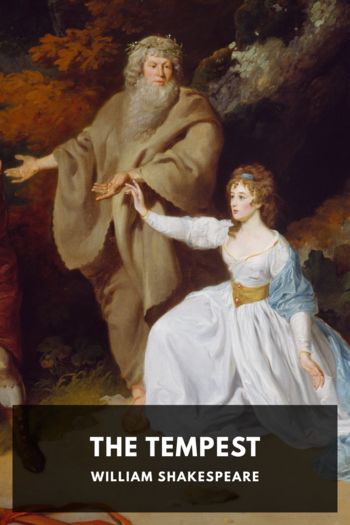The Tempest, William Shakespeare [good summer reads TXT] 📗

- Author: William Shakespeare
Book online «The Tempest, William Shakespeare [good summer reads TXT] 📗». Author William Shakespeare
And strays about to find ’em. Miranda
I might call him
A thing divine, for nothing natural
I ever saw so noble.
Aside. It goes on, I see,
As my soul prompts it. Spirit, fine spirit! I’ll free thee
Within two days for this.
Most sure, the goddess
On whom these airs attend! Vouchsafe my prayer
May know if you remain upon this island;
And that you will some good instruction give
How I may bear me here: my prime request,
Which I do last pronounce, is, O you wonder!
If you be maid or no?
No wonder, sir;
But certainly a maid.
My language! heavens!
I am the best of them that speak this speech,
Were I but where ’tis spoken.
How? the best?
What wert thou, if the King of Naples heard thee?
A single thing, as I am now, that wonders
To hear thee speak of Naples. He does hear me;
And that he does I weep: myself am Naples,
Who with mine eyes, never since at ebb, beheld
The king my father wreck’d.
Yes, faith, and all his lords; the Duke of Milan
And his brave son being twain.
Aside. The Duke of Milan
And his more braver daughter could control thee,
If now ’twere fit to do’t. At the first sight
They have changed eyes. Delicate Ariel,
I’ll set thee free for this. To Ferdinand. A word, good sir;
I fear you have done yourself some wrong: a word.
Why speaks my father so ungently? This
Is the third man that e’er I saw, the first
That e’er I sigh’d for: pity move my father
To be inclined my way!
O, if a virgin,
And your affection not gone forth, I’ll make you
The queen of Naples.
Soft, sir! one word more.
Aside. They are both in either’s powers; but this swift business
I must uneasy make, lest too light winning
Make the prize light. To Ferdinand. One word more; I charge thee
That thou attend me: thou dost here usurp
The name thou owest not; and hast put thyself
Upon this island as a spy, to win it
From me, the lord on’t.
There’s nothing ill can dwell in such a temple:
If the ill spirit have so fair a house,
Good things will strive to dwell with’t.
Follow me.
Speak not you for him; he’s a traitor. Come;
I’ll manacle thy neck and feet together:
Sea-water shalt thou drink; thy food shall be
The fresh-brook muscles, wither’d roots and husks
Wherein the acorn cradled. Follow.
No;
I will resist such entertainment till
Mine enemy has more power. Draws, and is charmed from moving.
O dear father,
Make not too rash a trial of him, for
He’s gentle and not fearful.
What? I say,
My foot my tutor? Put thy sword up, traitor;
Who makest a show but darest not strike, thy conscience
Is so possess’d with guilt: come from thy ward,
For I can here disarm thee with this stick
And make thy weapon drop.
Sir, have pity;
I’ll be his surety.
Silence! one word more
Shall make me chide thee, if not hate thee. What!
An advocate for an imposter! hush!
Thou think’st there is no more such shapes as he,
Having seen but him and Caliban: foolish wench!
To the most of men this is a Caliban
And they to him are angels.
My affections
Are then most humble; I have no ambition
To see a goodlier man.
Come on; obey:
Thy nerves are in their infancy again
And have no vigour in them.
So they are;
My spirits, as in a dream, are all bound up.
My father’s loss, the weakness which I feel,
The wreck of all my friends, nor this man’s threats,
To whom I am subdued, are but light to me,
Might I but through my prison once a day
Behold this maid: all corners else o’ the earth
Let liberty make use of; space enough
Have I in such a prison.
Aside. It works. To Ferdinand. Come on.
Thou hast done well, fine Ariel! To Ferdinand. Follow me.
To Ariel. Hark what thou else shalt do me.
Be of comfort;
My father’s of a better nature, sir,
Than he appears by speech: this is unwonted
Which now came from him.
Thou shalt be free
As mountain winds: but then exactly do
All points of my command.
Another part of the island.
Enter Alonso, Sebastian, Antonio, Gonzalo, Adrian, Francisco, and others. GonzaloBeseech you, sir, be merry; you have cause,
So have we all, of joy; for our escape
Is much beyond our loss. Our hint of woe
Is common; every day some sailor’s wife,
The masters of some merchant and the merchant
Have just our theme of woe; but for the miracle,
I mean our preservation, few in millions
Can speak like us: then wisely, good sir, weigh
Our sorrow with our comfort.
When every grief is entertain’d that’s offer’d,
Comes to the entertainer—





Comments (0)